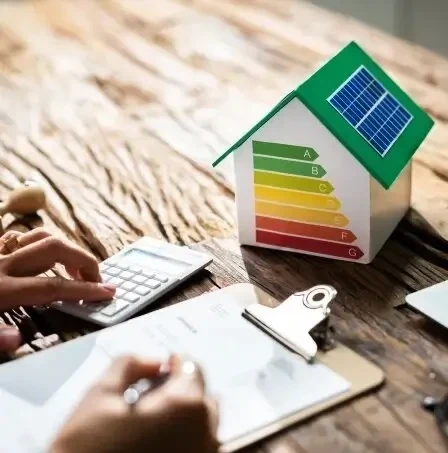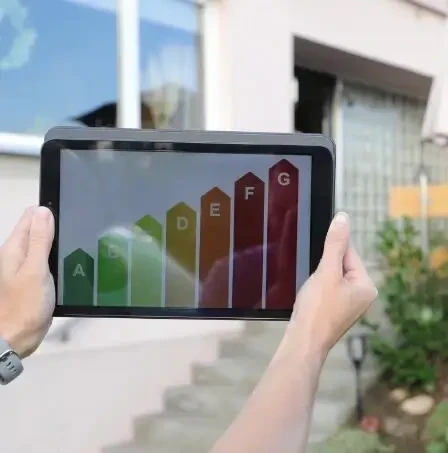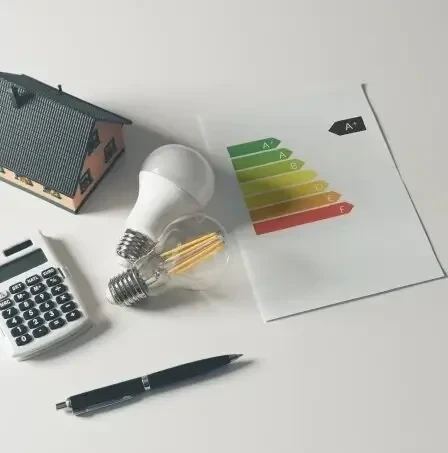Conserving energy is good not just for the environment but also for our wallets. By adopting energy-saving habits and making smart choices in energy consumption, we can significantly reduce energy use, lower our utility bills, and improve our energy performance certificate (EPC) rating.
This guide by Energy Performance Certificates will provide you with practical tips to save energy at home, making your living space more eco-friendly and energy-efficient.
When it comes to energy efficiency, the first step is understanding where you’re using the most energy. Identifying these major energy-consuming areas can help you spot ways to save energy and money. Additionally, you can adjust your lifestyle habits by understanding your energy usage patterns.
One of the biggest energy consumers in your home is heating and cooling. In particular, space heating is one of the most expensive energy uses, as it requires a lot of power to keep a room at a comfortable temperature. Additionally, older homes often need to be adequately insulated, leading to increased energy usage for heating and cooling activities.
Another major consumer of energy in the home is lighting. Incandescent light bulbs consume more electricity than their modern LED counterparts; opting for LED lights can help reduce your electricity bill over time.
Finally, appliances such as refrigerators, freezers, dishwashers, microwaves, ovens and washing machines are also significant contributors to your home’s overall electricity usage.
Replace older models of appliances like fridge freezers, washing machines and tumble dryers with energy-efficient versions. Look for devices with the best energy rating as they consume less electricity and water, significantly reducing energy costs.
Installing a smart metre will allow you to monitor your energy consumption in real time. If you are conscious of how much energy you use, you can make educated choices about how to cut back on consumption and, as a result, save money.
If you have a combination boiler, check to see that the flow temperature is set appropriately so that you save energy. Installing programmable thermostats and radiator valves can help you save money on heating costs and heat only the used rooms.
Perform routine audits of your energy provider and your tariff to ensure you get the best bargain possible. If you want to protect yourself against the swings in the energy price cap, you might think about getting fixed-rate energy price guarantees.
To reduce the heat that escapes your home and conserve more energy, insulate its walls and install windows with double glazing.
Seal gaps around doors, windows or letterboxes to prevent draught from entering your home and to keep warm air inside.
Switch to LED or CFL light bulbs instead of standard incandescent lights because they consume less energy and last far longer.

Use more efficient shower heads and wash your clothes at lower temperatures to reduce hot water usage.
Always run your appliances, such as washing machines and dishwashers, with a full load to maximise energy use and efficiency.
During the winter months, keep your drapes and blinds closed at night to avoid heat loss and open them during the day to let sunshine naturally warm your home.
If you have a fireplace in your home that you don't use, you might want to get a chimney balloon to cover it so that warm air doesn't go out and cold air doesn't get in.
Small and simple habits like turning off lights and appliances when not in use and unplugging chargers can result in significant energy savings.
Wrapping your hot water cylinder with an insulating jacket can minimise heat loss and reduce energy consumption.
Be cautious of activities that need a lot of energy, such as running the air conditioner or using your electronic gadgets for longer periods.
The heating in an empty room should be turned off to avoid wasting energy and money.

Improve Your EPC Rating
By following these energy-saving tips at home, you can dramatically cut down on the energy you use and the amount of money you spend on your energy bills. These tips could also improve your EPC rating, which is the information you can find on your energy performance certificate.
An energy performance certificate is a standardised report that rates a property’s energy efficiency on a scale from A to G, with A being the most energy efficient and G being the least efficient. Qualified assessors issue the EPC after inspecting the property and evaluating factors like construction, heating systems, insulation, lighting and more.
Homeowners can enjoy cost savings, boost their property value, enhance their quality and comfort and contribute to a more sustainable future by practising these energy-saving tips and improving their EPC rating.
An EPC inspection takes about 30 minutes for a two-bedroom house. We’ll take photos of the following, and these will serve as evidence to support our findings:
Get in touch with Energy Performance Certificates to schedule an assessment of your property’s energy efficiency. To get started, simply place your order online and choose your property type. One of our assessors will contact you to confirm the details of your property within two working days.
Clients with various properties can apply for multiple EPCs in just one request. Contact us at 0203 397 8220 for bulk EPC orders and discounts.
